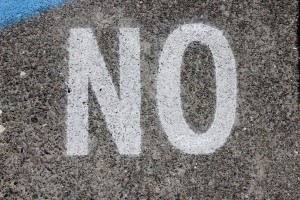Because I have a very mobile, very curious, never-sleeping 18-month old boy (Nate), “no” has become a very regular part of my vocabulary. “No, you can’t launch yourself off the top of the couch. No, you can’t eat dog food (Although I’m starting to wonder if it would be that bad). No, you can’t squeeze the baby chickens. No, you can’t fish in the toilet. No, you can’t use a hammer on the windows. No, you can’t use a hammer at all. No, you can’t stay awake for 24 hours. No, you can’t have my beer (Although he may finally sleep…I’m kidding people!). No, you can’t stick your crayons and cars and cereal puffs in the DVD player. No, Momma’s camera is not a toy. No, no, no.”
Anyone who has spent even just a little time around a developing child will tell you that more often than not, toddlers, kids and teenagers (and quite a few adults) don’t take “no” for an answer. No they don’t. I am learning that daily, even hourly. As I have these battles with my son, watching him accept or test the boundaries being built, I can’t help but draw a parallel to life and echo Tim’s point from “Don’t Feed the Alligators”. Yes, some “no’s” exist to keep us safe or steer us away from bad decisions. However, I believe some “no’s” exist to refine us, to strengthen us, to make us fight harder to overcome the obstacle. Some “no’s” challenge us to think outside of our box and step outside of our comfort zones. Isn’t it often our resistance to “no” that brings our biggest achievements, our greatest success, our strongest life?
How many cancer survivors do you know that initially heard, “no, we can’t help you.”? What if Walt Disney had taken “no” for an answer after being fired for “lacking imagination”, and after numerous failed businesses? What if the Wright brothers had taken “no” for an answer with each failed flying machine? Imagine if Abraham Lincoln had quit trying when he experienced numerous defeats in his runs for public office? What if Theodor Seuss Giesel had taken “no” for an answer when over 20 publishers rejected his first book? What if Beethoven had listened to his violin teachers when they said he would never succeed in composing?
I could go on with that list, and we can agree the world would be a much different place had these individuals taken “no” for an answer. Hopefully we have all been given a healthy dose of “no’s” to keep us safe and teach us respect for boundaries. Hopefully we have all been given enough encouragement when we hear those “no’s” that mean “keep going, try harder”. At 18 months, my son is just learning about safety and permissible behavior. He is learning that “no” is survivable. He is also learning that with a few extra letters and redirection, “no” can become “not this way…but try this.”
Next time you hear “no”, I challenge you to pause and think about whether or not it really means “no”. I know Nate will!



More power to you mama! “This too will pass!” ( I think) 😉